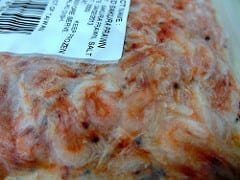The use of a refrigerated shipping container, like the ones we offer at Kiwi Box, is one of the best methods ensuring the integrity of your products. Our customised units can be used to keep products at a specific temperature to lengthen their lifespan, prevent spoilage and ensure they are always ready when you or your customers need them!
That being said, improper use of your cold storage unit can lead to common storage problems like spoilage and refreezing. In today’s article, I’m going to share my best practices on preserving food in cold storage units. By taking a few minutes to read this article, you can avoid the stress and financial loss that can occur when proper cold storage techniques are not used.
Be strict about stock rotation
In order to ensure that goods don’t get lost in the back of your storage unit, I recommend sticking to a “first in, first” out system. This system requires that older products, which are closer to their expiration date, are moved to the front or brought out of cold storage before new products are added to the unit.

Be diligent with temperature regulation
Most losses occur within 24 hours, which means you have a small window of time to detect and address a problem before all is lost. Make it part of your routine to regularly check the temperature of your cold storage unit. By doing this, you’ll be immediately aware of any temperature fluctuations that could damage your products. It’s much more cost effective to deal with a temperature problem in a timely manner than write off a lot of spoiled goods.
Install a temperature alarm
Better yet, invest in temperature alarms that will automatically alert you when the temperature in your cold storage unit goes above or below your specified range. This technology can provide some extra peace of mind. Just don’t forget to have your system maintained and checked at regular intervals to ensure it is working as intended!
Maintain proper volume
You need to know exactly how much volume your unit can handle. An over-packed unit cannot maintain an even temperature throughout. With an over-packed unit, you cannot be assured that your goods will be safe for sale or distribution. Know your volume limits and stick to them!
Use appropriate packaging
Goods that have not been packaged appropriately are more likely to experience freezer burn or contaminate other products in your refrigerated shipping container. Packaging is something that should be taken seriously – don’t cut corners or try to run things on the cheap.

Call in the experts!
I’ve saved my best piece of advice for last. When in doubt, reach out! At Kiwi Box, we have helped hundreds of customers prolong the shelf life of their products with our cold storage shipping containers. During this time, we’ve learned just about every trick in the book and we’re always happy to share our knowledge. If you’re in doubt about how you’re storing food or just want to make sure you’re doing it the best way possible, please contact us today. Our friendly team is happy to field your questions and give you pointers on any aspect of cold storage.
Photos
Frozen lives by Marra Taqos, CC BY 2.0
Winter freshness by Sergey Kukota, CC BY-SA 2.0

